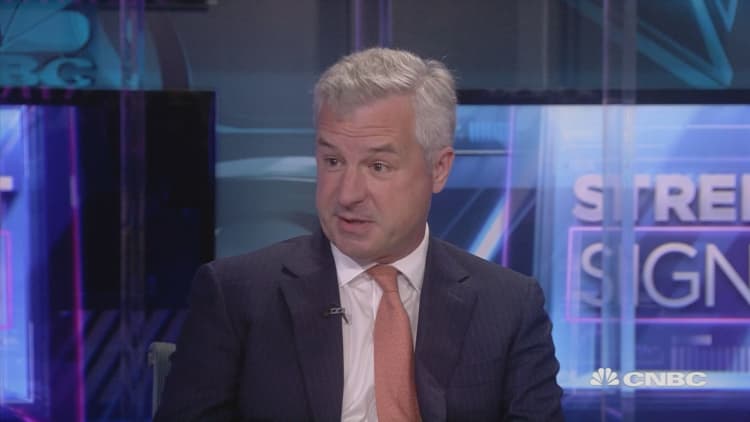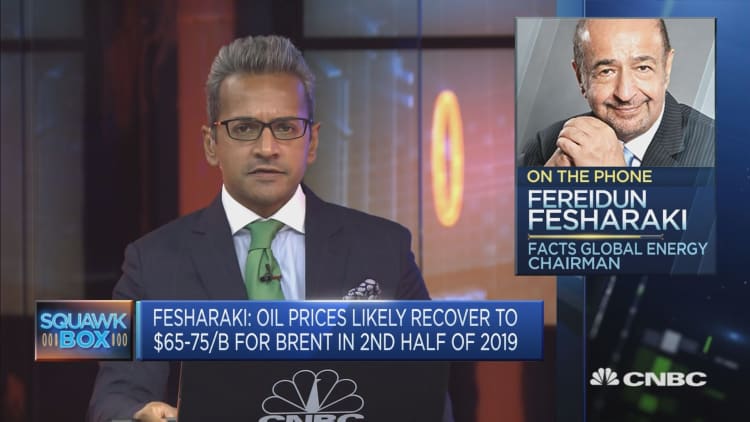
Oil traders are under-prepared for another flare-up in U.S.-Iran tensions, energy analysts have told CNBC, as President Donald Trump's administration prepares to impose "major" new sanctions on the Islamic Republic.
Six oil tankers and a U.S. spy drone have been attacked since May either in, or near, the Strait of Hormuz — the world's busiest transit lane for seaborne oil shipments that separates Iran from its neighboring Gulf states.
The flurry of attacks has escalated tensions between the U.S. and Iran.
The prospect of another military conflict in the Middle East prompted international benchmark Brent crude to climb around 5% last week, while U.S. West Texas Intermediate (WTI) jumped more than 10% — its biggest gain since December 2016.
Nonetheless, David Hewitt, an oil and gas analyst at Macquarie, told CNBC's "Street Signs Europe" on Monday that oil traders were still underestimating the impact of another flare-up between Washington and Tehran.
When asked whether there is an insufficient amount of geopolitical risk premium priced into energy markets at present, Hewitt replied: "The simple answer is yes — and absolutely yes."
"If we go to more sanctions today… You would expect that they will react more. So, back to the geopolitical pricing in crude, you have got to think that there is a greater potential for something to happen at some point in the future be it this week or next, or as we go forward," Hewitt said.
Brent crude was trading at $65.28 at around 8:30 a.m. ET on Monday, up around 0.1%, while U.S. WTI stood at $57.88, more than 0.7% higher.
Chances of US-Iran tensions escalating are 'very, very high'
Trump reportedly approved military strikes against Iran late Thursday in retaliation for the downing of an unmanned American drone, before abruptly reversing his decision.
The U.S. president has since said in an interview with NBC News that he does not want war with Iran but, if it comes, there will be "obliteration like you've never seen before."
Tensions between the U.S. and Iran have spiked since May last year when Trump withdrew from the 2015 nuclear deal and reinstated sweeping sanctions on the country.
"They will strike back one way or the other; I think chances of tensions becoming bigger is very, very high in the near future," Fereidun Fesharaki, who was a former energy advisor to the government in Tehran in the 1970s, told CNBC's "Squawk Box" on Monday.

Chances of a conflict are at least 50% right now, Fesharaki said. It may not be a "full war," he pointed out, "but conflict which would disrupt (energy) supplies."
If Trump had carried out those military strikes as planned, the geopolitical risk premium on oil prices would have been $5 to $10 a barrel, said Fesharaki. Now, the geopolitical risk premium "is only one or two bucks at the moment, it's not really high enough," he added.
Talk of a return to $100 oil is 'greatly exaggerated'
Earlier this month, a top military aide to Iran's supreme leader Ayatollah Ali Khamenei, Yahya Rahim Safavi, warned that "the first bullet fired in the Persian Gulf will push oil prices above $100."
However, Stephen Brennock, an analyst at PVM Oil Associates, told CNBC via email on Monday that he was skeptical about the prospect of a dramatic surge in oil prices.
"Some have talked about the potential for a return to $100 oil in the event of another flare up of U.S.-Iran tensions but I suspect these are greatly exaggerated."
"My gut tells me that neither side wants to be dragged into military conflict and thus the odds of a sustained disruption to supplies in the region are slim. Undoubtedly, tensions will continue to run high as Washington turns the sanctions screws on Iran but war (thankfully) currently seems like a distant reality," Brennock said (parentheses in quote are his).
— CNBC's Huileng Tan contributed to this report.


